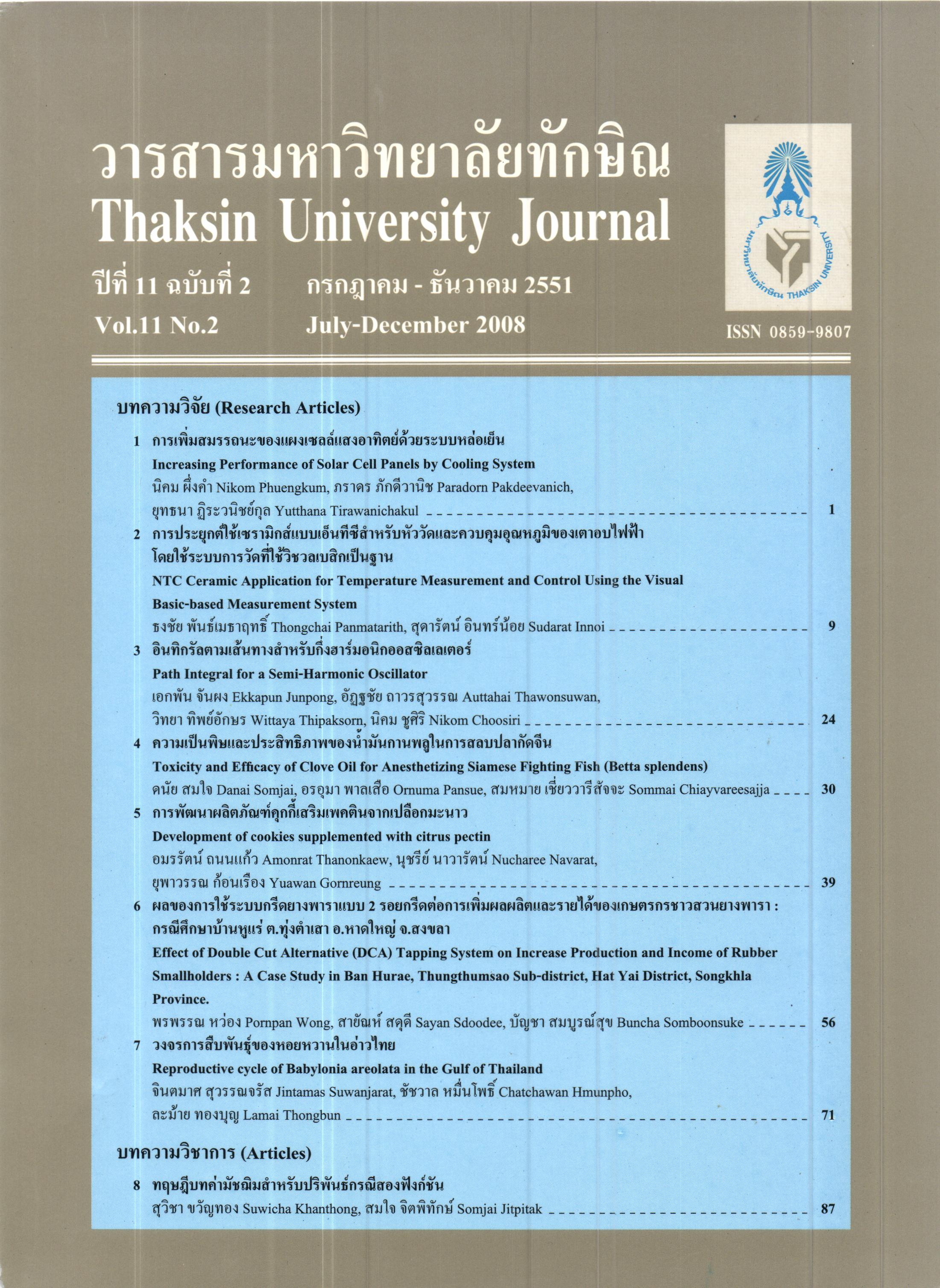การประยุกต์ใช้เซรามิกแบบอ็นทีซีสำหรับหัววัดและควบคุมอุณหภูมิของเตสอบไฟฟ้าโดยใช้ระบบการวัดที่ใช้วิชวลเบสิกเป็นฐาน
Main Article Content
Abstract
บทคัดย่อ โครงงานนี้เกี่ยวข้องกับการเตรียมสาร ZnO+Fe2O3 จากวัสดุตั้งต้นที่เป็นผงโดยวิธีเทคนิคเซรามิกส์มาตรฐาน วัดสมบัติเอ็นทีซีและได้แสดงการประยุกต์ใช้งานของสาร ได้สร้างเครื่องมือสำหรับการทดสอบสารที่ประกอบด้วยวงจร เชื่อมต่อ (ADC0809 และ 74LS244), การ์ด ET-PCI8255V3 และ วิชวลเบสิก สาร ZnO+Fe2O3 มีค่าความต้านทาน 18.5 k Ω ที่อุณหภูมิห้อง สาร ZnO+Fe2O3 เป็นเซรามิกส์แบบเอ็นทีซีที่มีความต้านทานลดลงในขณะที่อุณหภูมิเพิ่มขึ้นในช่วง 31 ถึง 90 oC ค่าสัมประสิทธิ์อุณหภูมิของความต้านทานที่เป็นลบ (α) ของสารที่คำนวณได้ โดยอาศัยข้อมูลจากการวัดมีค่า -0.946 %/oC ผลการทดลองพบว่าสาร ZnO+Fe2O3 ทำหน้าที่เป็นหัววัดอุณหภูมิได้ การวัดอุณหภูมิจะอาศัยผลของ ปรากฏการณ์เอ็นทีซีและสมการความสัมพันธ์ T= -66.646Vs2+518.01Vs-912.52 ได้สร้างและทดสอบระบบควบคุม อุณหภูมิของเตาอบไฟฟ้าโดยใช้สาร ZnO+Fe2O3 เป็นหัววัดอุณหภูมิและวิชวลเบสิกเป็นโปรแกรมควบคุมเป็นผลสำเร็จ ระบบที่ได้สร้างขึ้นนี้จะนำไปใช้สำหรับการทดสอบวัสดุในเรื่องอื่นๆในช่วงอุณหภูมิ 31 oC - 94 oC ต่อไป
This project involved sample preparation of ZnO+Fe2O3 from starting material in powder form using standard ceramics techniques. NTC properties of the samples were measured and application of the samples were demonstrated. Instruments for sample testing were constructed and composed of interfacing circuit (ADC0809 and 74LS244), ET-PCI8255V3 Card and Visual Basic. The resistance of ZnO+Fe2O3 sample was 18.5 k Ω at room temperature. ZnO+Fe2O3 was NTC ceramics that resistance decreased as increasing temperature in the interval of 31 oC-90 oC. This sample showed NTC properties. The negative temperature coefficient of resistance (Ω) of this samples that calculated by measuring data was -0.946 %/oC. The result showed that ZnO+Fe2O3 can be used as temperature sensor. Temperature was measured by using the NTC effect and the relation of T= -66.646Vs2+518.01Vs-912.52. Oven temperature control system was successfully constructed and tested with ZnO+Fe2O3 temperature sensor and Visual Basic Program. This system will be further used for other topics of material testing in the temperature range of 31 oC - 94 oC


